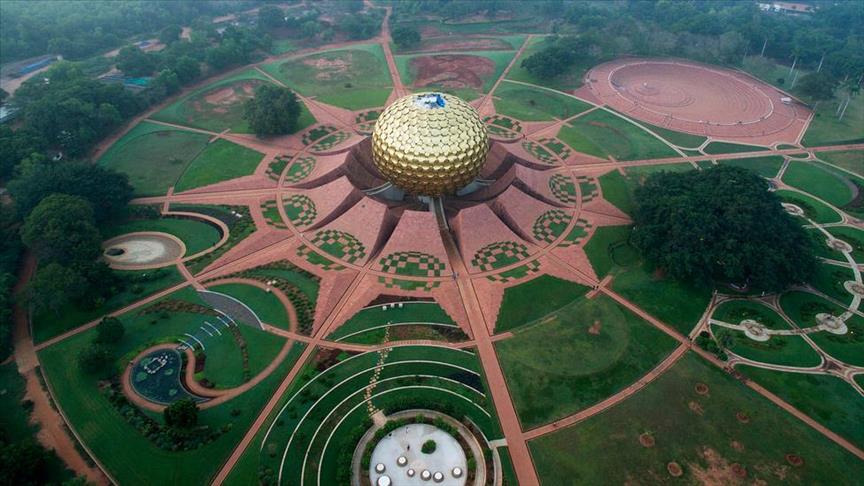 Matrimandir, a large meditation chamber built from gold-plated discs, is both the physical and spiritual center of Auroville, southern India
Matrimandir, a large meditation chamber built from gold-plated discs, is both the physical and spiritual center of Auroville, southern India
By Sena Guler
ANKARA
A one-of-a-kind experimental community gathered on the outskirts of southern India is preparing to mark its 51st anniversary with a series of activities.
Auroville, a professed "utopia" hosting people from over 55 countries, was formed with an aim of attaining unity and harmony among its inhabitants.
The 20-square-kilometer city, also known as the City of Dawn, is located near Pondicherry in the south of the country.
Auroville was the brainchild of Mirra Alfassa, a French woman locally known as the Mother, who was inspired by her close friend Sri Aurobindo, an Indian philosopher and yoga guru.
Alfassa once described the motive behind Auroville as a settlement where "human unity" could be realized.
"Auroville wants to be a universal town where men and women of all countries are able to live in peace and progressive harmony above all creeds, all politics and all nationalities," the settlement’s official website quoted her as saying.
The city was officially founded on Feb. 28, 1968, with the participation of youth from 124 nations -- including various Indian states -- in a ceremony where the youth carried the respective flags and soil of their countries.
"The representatives brought with them some soil from their homeland, to be mixed in a white marble-clad, lotus-shaped urn, now sited at the focal point of the Amphitheatre," according to the town's website.
Built on a once desolate patch of desert, Auroville has been recognized and supported by UNESCO since its establishment.
The man-made settlement consists of four zones: an industrial zone, an international zone, a cultural zone and a residential zone.
Matrimandir, a large meditation chamber built from gold-plated discs, is both the physical and spiritual center of the township.
Auroville is self-sustaining with no government, no currency and no religion.
Aims yet to be realized
Upholding tradition, Auroville residents plan to mark the town’s 51st anniversary on Feb. 28 with a bonfire in the central amphitheater, among other activities.
Locals will begin celebrating the occasion one week before the actual day, according to Auroville resident Divya from Auroville OutreachMedia, a media portal for the township.
"From Feb. 21th to March 8th, we will be hosting several art exhibitions and installations, as well as the ‘Art camp’, tango festival and Auroville Choir concert," Divya told Anadolu Agency.
Aurovillians usually do not use a family name and are only referred to by their given name, as is the custom in the Indian state of Tamil Nadu where the town is located.
Gilles -- who serves in the township’s archives -- said Auroville’s aim to achieve human unity and world peace were yet to be realized on Earth.
He added that while it would take time for the ideal to become reality, the people of Auroville were making an attempt in this direction.
Noting that the town was well-connected with the outside world, he said it could not exist and develop if the local people living in its vicinity were not happy with Auroville’s presence.
"Of course, there will always be some people who will say Auroville should do more but, by and large, Auroville has a fairly good relation with its village neighbors," he added.
Helmut, an ex-member of the Working Committee -- one of the groups tasked with the town’s governance -- said Auroville welcomes visitors from all over India and the world, but that it had not been conceived as a "tourist attraction."
On a similar note, the city's website says that the city was not interested in "drawing huge crowds to the project" in accordance with the wishes of the Mother.
Around one million people visit the city for short or long periods per year, Helmut added.
"Auroville is not a commune, it is a town in the making with plans for 50,000 habitants. We are open to anyone who commits to the central ideal of human unity," he said.
He added that the town currently has some 3,000 permanent residents from more than 55 countries with all continents represented.
Crime and corruption
According to Auroville’s Charter originally written in French by the Mother, the township does not belong to any particular person or group, but to "humanity as whole."
However, friction occurred between the people following the Mother’s death in 1973 and Auroville Foundation -- a body appointed by the Indian government -- started to hold the land and assets.
There have been several reports of robbery, sexual harassment, murder and corruption in the city in the recent years, damaging its image.
Helmut refused the claims and said that the crimes were perpetrated by non-Aurovillians.
"This entire area - including the neighboring villages and small towns - is known as 'Auroville', so if a serious crime is reported in the name of Auroville, it is not necessarily associated with the project," he said.
Anadolu Agency website contains only a portion of the news stories offered to subscribers in the AA News Broadcasting System (HAS), and in summarized form. Please contact us for subscription options.


